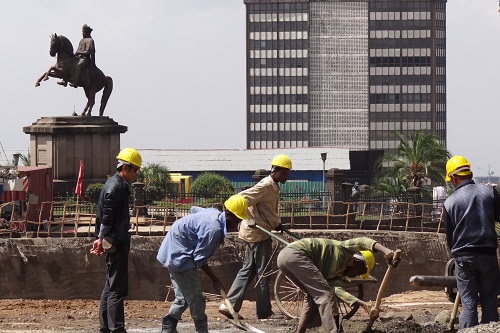Adam Jones/CC photo
Ambo Mekasa interviews Teklebirhan Gebremichael
We have late been introducing lulus from different walks of life and touching a panoply of socio-political and other events in Ethiopia and abroad. Today, we have come up with a new guest that has a wealth of experience in the economic sector.
Today’s guest is the senior economist and author Teklebirhan Gebremichael. Teklebirhan was born in 1947 in Addis Ababa. At the age of six he was dragged to the nearby Haile Selassie School (also known as Kokeb Tsebahe) against his will by his big brother. He was entrusted to a teacher called Tefera Haile Silassie, who later became a prominent minister of Labor and Social Affairs.
He completed his elementary and secondary education at the same school and joined the then Haile Selassie University (which began as University College of Addis Ababa- UCAA), majoring in economics and sociology. This was in 1963, and six years later, after a break of one year due to illness and another year of the then university service stint at Gelawdios School in Nazreth (now Adama).He graduated with a B.A degree in economics and pursued his education during those turbulent years of the famous Ethiopian Students’ Movement.
He was fortunate enough to listen to the heated debates on Marxist historical and dialectical materialism. Also on the Philosophies of Hegel and Kant between student movement stalwarts such as Yohannes Sebehatu and Gebru Gebrewold. Birhanmeskel’s mesmerizing oratory will remain imprinted on his mind as long as he lives. Yohannes Admasu’s alternating macabre and sublime poetry would make the most indifferent sit up and notice. Gemoraw’s (Hailu’s) poetic genre fulminating against the leading lights of the world including intellectual giants such Marconi and, in fact, against the entire humankind in his masterpiece, Bereket Mergem. It is of seminal importance in Ethiopian literature.
Then in 1969 he graduated with no mean nostalgia behind him and joined the national bank of Ethiopia as a junior clerk (the job grade for a new recruit). He worked on the balance of payments, macro-economy analysis, exchange rates, money and banking, etc. and wrote regular articles for the bank’s Quarterly Bulletin and Annual Report. He was later appointed as Director of the Bank’s Economic Research Department. Then, he was seconded to the Supreme Planning Council under the Derg regime. There, he expanded and refined his knowledge of micro-economics working on investment, project analysis, national income accounting and socialist planning methodology.
Eventually, he was highly gratified to have been given the opportunity to contribute two chapters to the Derg’s Ten- Year Perspective Plan. Towards the end of the Derg’s regime, Teklebirhan returned to the National Bank of Ethiopia and served as Economic Advisor to the Governors on contract basis. Then, for a reason obscure to him, his work contract was terminated in January 2010. Since that time he hasbeen a full time pensioner. Beyond his economic knowledge, Teklebirhan has written books on the socio-political conditions of the country.
I had the opportunity to interview the senior economist and author Teklebirhan Gebremichael on the economic issue of the country:
What has been your impression of Ethiopia’s economic development under the incumbent (before reform)?
There has been considerable infrastructure development as well as building construction at high cost in terms of inflated prices, resource, wage, embezzlement and time delay, etc. The impact of this infrastructural development has not been manifested in terms of increased food production and industrial development.
Over the last twenty-seven years there has been no structural transition from small-holder farming to commercial farming, agro-industry and industrial development. The share of manufacturing in the GDP is still not more than five percent. Since, the government’s development program is dependent on domestic and foreign credit and debt, extremely large domestic and debts have emerged. For example, domestic outstanding bank debt of the government development agencies is reported to have reached 400 billion birr, while government outstanding foreign debt is fast approaching the 30 billion dollar mark.
Hence, the impact of the government’s credit-driven development program, rather than being increased food production and agricultural and industrial exports, has been to exacerbate domestic inflation (cumulative inflation has passed 4000 percent) currency depreciation (the Birr has depreciated by about 93 percent), youth unemployment of nearly 60 percent.
What do you think are the major causes of all these problems?
In short and in general, the causes are poor economic and political leadership lacking transformation and dynamic governance as well as misguided land, credit, education, fiscal, monetary and development policies and strategies and hardships. The combination of all these resulted in all sorts of economic shortages and hardships.
These include high unemployment, high income and wealth inequalities, corruption, water, electricity, transport and housing shortages, high inflation, currency depreciation and foreign exchange shortage, among others.
What are your views on public awareness in Ethiopia as regards economic concepts, categories and variables such as saving, investment and entrepreneurship?
The general level of economic awareness of the public is quite low. The rural population is generally aware that it must sustain the back breaking drudgery just to eke out a bare subsistence to survive on. Peasant farm productivity due to increased fertilizer use appears to have peaked, making the negative effects of land fragmentation evermore keenly felt.
On the other hand, although grain prices have gone up pasi passu with general inflation. So, have agricultural production costs. This implies no increase in real incomes (ie. inflation adjusted) and, therefore, in real savings, if any, in fact some peasants appear to have profited by selling ( de facto) their land holdings at sky- high land prices than by farming them. Such farmers have become real estate developers of sorts, of course, on a micro scale, by putting up shacks on the unsold parts of their land holdings and renting them off. So, we may conclude that there is economic awareness at a rudimentary level in rural Ethiopia in terms of micro production, buying and selling on traditional markets, earning income and profit and shifting to other economic activities as in the” real estate” example given above.
By contrast, economic awareness of the urban population in Ethiopia is understandably more sophisticated in terms of all the economic aspects under discussion including employment, unemployment, markets, buying and selling, saving investment, income, profit, inflation, foreign exchange, exports, imports, etc. But, the major problem is that knowledge, hard work and entrepreneurial talent are not thought of as being the real sources of value.
Money and wealth, but political connections to the incumbent (before reform) patronage system are so thought of. This counterproductive mindset has led to the violation of what may be considered to be the two basic laws of society. One of them runs as follows: political power must be held only through free and fair election; the other one stipulates that money must be earned by creating value equivalent to it as determined by the price set by the forces of demand and supply in a free and competitive market. This, of course, represents a higher form of economic awareness which even the EPRDF leadership has not possess. That is why corruption had become so endemic in the country.
Could you comment on Ethiopia’s tax system?
As you probably know, there is no such thing as a perfect tax system. Every country simply tries to improve its taxation system positing it against what are known as the canons of taxation. The canons include equality, certainty, economy, convenience, productivity, elasticity, simplicity and diversity. As would be expected, Ethiopia’s tax system assessed against these canons is bound to fail miserably.
To start with, although the tax effort (rate) at no more than 12 percent , is reported to be one of the lowest in Africa. Tax complaints arising from the arbitrary nature of some taxes (especially related to presumptive taxation) are widespread. Another reason for reluctance to pay taxes on the part of tax-payers is lack of confidence on the government (before reform) mainly because of corruption including at the highest echelons of power. So, tax evasion is estimated to be high. With regard to particular taxes, the value-added tax currently levied at 15 percent is considered to the high, and many people think something like 7 percent would be about right. In addition, value-added taxation on basic consumption goods and services such as food should be lifted. On the other hand, tax revenue should be spent on economic and social priorities without waste or embezzlement.
How do you view the EPRDF’s recent privatization guidelines?
As to me, privatization is not a priority as of now. However, since the government is already committed to privatization, I would suggest that first a privatization board of professional economists, accountants, valuation experts, property lawyers, etc. be set up. Then each enterprise slated for privatization would be evaluated on its own merits and demerits. Therefore, the approach should be on a case by case basis. The catch phrase here should be “let well alone”. From this perspective, I would not touch national champions like Ethiopian Airlines. Background checks on prospective domestic and foreign buyers and investors should be made. Frankly speaking, I do not know why privatization should be considered a priority by the government right now when what we immediately need is fundamental reforms.
Quite on the contrary, what is uppermost in mind is nationalization of the likes of EFFERT and TIRET.
What do you think about Ethiopia’s joining the World Trade Organization (WTO)?
That is another issue that does not command priority in my scheme of things. Why bother about WTO rules such as the most favored nation and national treatment rules when Ethiopia as a backward developing country already enjoys preferential treatment under the existing international trade system. You know something I would tax imports of private automobiles twice as heavily as they are now. Because most private car owners do not deserve them. These folks are neither in commercial farming nor in agro-industry, nor yet in manufacturing. How on earth did they make the money to buy those horrible and deadly killers and polluting agents? If Ethiopia becomes a member of the WTO, Japan would certainly complain.
What then is the way forward for Ethiopia?
Well, “that is a two trillion Birr question!” as I am always inclined to say when that question is put to me. By the way, the inflation-swollen GDP is fast approaching that figure. Forget about purchasing power, because in Ethiopia that does not seem to be an issue any longer, for some obscure reasons. Well, to come back to your question, an honest answer would be “I don’t know”.
But when pressed, I often revert to the fundamental basis of economics: land, labor, capital and enterprise. In Ethiopia’s specific economic context, the mention of the word “land” immediately revokes reform. Mention of labor elicits quality education and entrepreneurial talent. Capital calls for banking and financial sector reform.
Hence, the first order of business is land reform and that would call for constitutional reform. Labor in the Ethiopian context largely means raising the quality of education and training, including that of entrepreneurial talent development. Again in the Ethiopian context, capital means largely bank credit. Hence, financial sector reform and pro-production and productivity credit policy would be required. But above all, we need transformation and dynamic political economic financial and business leaders. Hence, after all, there is a great deal of truth in the Marxist tenet that the source of value is human labour, particularly human labour in the form of transformational leadership.
Teklebirhan Gebremichael
Ambo Mekasa
EPA reporter, earning his BA in English Language and Literature from Arsi University.




No Comments Yet!
You can be first to comment this post!